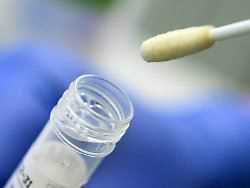Friday 29 October 2021
Long Covid in professional athletes
When you can’t breathe and your pulse is racing
Joshua Kimmich has concerns about the vaccine and has not yet been vaccinated. Examples show what can happen when high-performance athletes become infected and suffer from Long Covid. An expert: You cannot force an increase in performance after Long Covid.
“I’m slowly getting back into training and I feel pretty good so far. But there will still be a long way to go.” Canoeist Steffi Kriegerstein fell ill with Corona almost a year ago in December 2020. Since then, not much has gone over 500 meters in a four-man kayak at the Rio Olympic runner-up. Long Covid. No competitions, no games in Tokyo. During the summer, the 28-year-old woman from Dresden helped out as a trainer in the club.
An example. There are more, some are known, others less because they are not highly decorated athletes from the front row like the former wrestler Frank Stäbler. The three-time world champion and two-time European champion suffered from Long Covid before taking part in the Olympics and had breathing problems. He worked his way up again with difficulty and even won bronze in Tokyo.
In principle, competitive athletes are in a better position, says Professor Wilhelm Bloch from the German Sport University in Cologne: As a rule, they have a more efficient immune system that is better able to deal with infections. Transferred to the Covid situation, he would also see a competitive athlete at an advantage, the 62-year-old explained in a conversation with the German press agency. “A competitive athlete is more likely than a normal consumer to notice that something is wrong in his body.”
“Marin had big problems with the air”
Therefore, competitive athletes are more likely to notice if they are not one hundred percent at the same level as before a Covid infection, emphasized Bloch, Professor of Molecular and Cellular Sports Medicine.
Just as Marin Pongracic should have felt in the end. The now 24-year-old Croatian national soccer player fell ill with Corona in November 2020 when he was still playing for VfL Wolfsburg. He returned after negative tests. Even then, external experts thought it was too early. “Marin had big problems with the air,” said then coach Oliver Glasner when he had to replace Pongracic at the break in the game against 1. FC Union Berlin. “He had both arms on his knees every now and then during the first half, as you normally do at the end of extra time.” At Pongracic it happened for the first time after 15 minutes, said Glasner. Protocols for a return to competitive sport have long been drawn up – in terms of health that is at stake.
Doctor Bloch urgently advises vaccination after the debate has got underway again through the statements of Pongraci’s Bundesliga colleague Joshua Kimmich and his concerns about the current vaccine. “There are still vaccine skeptics among athletes and students here, and I always tell them that Covid is a serious disease and that nobody is protected from it,” he said. “The risk-benefit assessment is very important. The vaccination is not free of side effects, but in relation to the disease it is much, much less problematic.”
“That is the typical phenomenon”
Because Long Covid is a burden. The body, because what is otherwise hardly an effort turns into a great effort. The mind, because athletes can sometimes find it difficult to cope with such a drop in performance, sometimes with an unpredictable end.
“It’s more like endurance athletes” who would come by, reports Bloch from his experiences at the German Sport University. “It often has to do with the fact that they have specific demands on the lungs and metabolism.” After a few meters your pulse is racing. “A classic”, as Bloch puts it. They also do not know one hundred percent why that is so. Usually the resting heart rate is also higher than before the corona infection.
It seems to be the case that people after illness in such cases enter the so-called anaerobic metabolism earlier. It is about the area of the highest possible stress intensity. For example, a triathlete reported that she suffered from shortness of breath when she was exerted and then had to stop. Only after a while does it get a little better under stress. Bloch: “That is the typical phenomenon. Even the average consumer would notice that if he did it.”
High-performance athletes have long been transparent in many areas. All values are measured, compared and serve as the basis for the training. “If someone in sports has a loss of performance due to Long Covid, then you can’t force it to build up,” emphasizes Bloch.
He then advises generally to short exercise phases with reduced intensity. Then extend the exercise times and reduce the breaks so that you then come to a continuous exercise. “And then you can increase the intensity again.” Many would ultimately reach their level of performance again. But with some he is skeptical.
